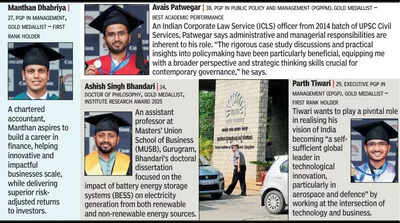AI’s short-term impact exaggerated, long-term underestimated: Dr Devi Shetty | Bengaluru News

Bengaluru: Artificial intelligence is not going to change the world as it is projected, but will have an impact only after 10 years, said Dr Devi Shetty, chairperson, board of governors, Indian Institute of Management Bangalore.
Speaking at the 50th convocation of the institute Friday, Dr Devi Shetty said that the power of AI in the short run is grossly exaggerated. “Never put your house on AI. While its ability to change the world is grossly exaggerated in the short run, in the long run, it is grossly underestimated. You will only see the impact of AI after 10 years,” he said.
Devi Shetty went on to explain his argument through an example in healthcare: “When over 90% of hospitals don’t have basic electronic medical records, where is the AI going to transform healthcare? No one has bothered to build the digital platform. AI is important, but it is not going to change the world as it is projected,” he said.
As many as 798 students graduated from the institution on Friday.
S Somnath, former chairman of Isro and chief guest at the convocation, noted that AI is actually a result of the data that’s available. “And data storage, archival utilisation is going to be the biggest business in the days to come. But what is more important is AI and human beings are going to collaborate and work together. For example, you look at AI-driven diagnostics. Doctors getting replaced by powerful AI engines… medicines and genomics being driven more by AI. Will it ever become AI-driven? Hopefully, because they can compare data and then reach judgments much faster based on evidence,” he said.
Director Rishikesha Krishnan advised students that geopolitics is going to be a challenge that they will have to grapple with.
BOX: Gold Medallists
1. Manthan Dhabriya, 27, Post Graduate Programme (PGP) in Management, Gold Medallist – first rank holder
A chartered accountant, Manthan aspires to build a career in finance, helping innovative and impactful businesses scale, while delivering superior risk-adjusted returns to investors.
2. Faiz Alam, 26, PGP in Business Analytics (PGPBA), Gold Medallist – first rank holder
A civil engineer, Alam plans to work with start-ups, especially tech-focused ones. “While I have not narrowed down a specific sector yet, I want to contribute to solving real-world problems through analytics and technology,” he said.
3. Avais Patwegar, 38, PGP in Public Policy and Management (PGPPM), gold medallist – best academic performance
An Indian Corporate Law Service (ICLS) officer from the 2014 batch of UPSC Civil Services, Patwegar says administrative and managerial responsibilities are inherent to his role. “The rigorous case study discussions and practical insights into policymaking have been particularly beneficial, equipping me with a broader perspective and strategic thinking skills crucial for contemporary governance,” he says.
4. Ashish Singh Bhandari, 34, Doctor of Philosophy (PhD), Institute Research Award 2025
An assistant professor at Masters’ Union School of Business (MUSB), Gurugram, Bhandari’s doctoral dissertation focused on the impact of battery energy storage systems (BESS) on electricity generation from both renewable and non-renewable energy sources.
5. Parth Tiwari, 29, executive PGP in Management (EPGP), gold medallist – first rank holder
Tiwari wants to play a pivotal role in realising his vision of India becoming “a self-sufficient global leader in technological innovation, particularly in aerospace and defence” by working at the intersection of technology and business.
















